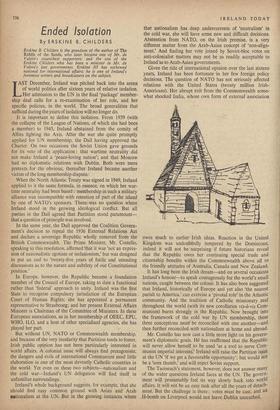Ended Isolation
By ERSKINE B. CHILDERS Erskine B. Childers is the grandson of the author of The Riddle of the Sands, who later become one of Mr. de Valera's staunchest supporters; and the son of the Erskine Childers who has been a minister in Mr. de Valera's last governments. Erskine III has eschewed national for international affairs; he is one of Ireland's foremost writers and broadcasters on the subject.
AST December, Ireland was pitched back into the arena of world politics after sixteen years of relative isolation.
Her admission to the UN in the final 'package' member- ship deal calls for a re-examination of her role, and her specific policies, in the world. The broad generalities that sufficed during the years of isolation will no longer do.
It is important to define this isolation. From 1939 (with the collapse of the League of Nations, of which she had been a member) to 1945, Ireland abstained from the comity of Allies fighting the Axis. After the war she quite promptly applied for UN membership, the Dail having approved the Charter. On two occasions the Soviet Union gave grounds for its veto of the application : that wartime neutrality did not make Ireland a 'peace-loving nation'; and that Moscow had no diplomatic relations with Dublin. Both were mere pretexts for the obvious; thereafter Ireland became another victim of the long membership dispute.
When the North Atlantic Treaty was signed in 1949, Ireland applied to it the same formula, in essence, on which her war- time neutrality had been based : membership in such a military alliance was incompatible with retention of part of the island by one of NATO's sponsors. There was no question where Ireland stood in the growing ideological -conflict. But all parties in the Dail agreed that Partition stood paramount— that a question of principle was involved.
In the same year, the Dail approved the Coalition Govern- ment's decision to repeal the 1936 External Relations Act and declare a sovereign Republic wholly removed from the British Commonwealth. The Prime Minister, Mr. Costello, speaking to this resolution, affirmed that it was 'not an expres- sion of nationalistic egotism or isolationism,' but was designed to put an end to 'twenty-five years of futile and unending discussions as to the nature and subtlety of our Constitutional position.'
In Europe. however, the Republic became a foundation member of the Council of Europe, taking to date a functional rather than 'federal' approach to unity. Ireland was the first State to recognise compulsory jurisdiction of the European Court of Human Rights; she has appointed a permanent representative to Strasbourg; and her present External Affairs Minister is Chairman of the Committee of Ministers. In these European associations, as in her membership of OEEC, EPU, WHO, ILO, and a host of other specialised agencies, she has played her part.
But without UN, NATO or Commonwealth membership. and because of the very insularity that Partition tends to foster, Irish public opinion has not been particularly interested in world affairs. A colonial issue will always find protagonists; the dangers and evils of international Communism need little elaboration in one of the most devoutly Catholic countries in the world. Yet even on these two subjects—nationalism and the cold war—Ireland's UN delegation will find itself in unfamiliar surroundings.
Ireland's whole background suggests, for example, that she should find easy common ground with Asian and Arab nationalism at the UN. But in the growing instances where that nationalism has deep undercurrents of 'neutralism' in the cold war, she will have some new and difficult decisions. Abstention from NATO, on the Irish premise, is a very different matter from the Arab-Asian concept of 'non-align- ment.' And finding her vote joined by Soviet-bloc votes on anti-colonialist matters may not be as readily acceptable to Ireland'as to Arab-Asian governments.
Given the tide of international opinion over the last sixteen years, Ireland has been fortunate in her few foreign policy decisions. The question of NATO has not seriously affected relations with the United States (twenty million Irish- Americans). Her abrupt exit from the Commonwealth some- what shocked India, whose own form of external' association owes much to earlier Irish ideas. Reaction in the United Kingdom was undoubtedly tempered by the Dominions; indeed it will not be surprising if future historians reveal that the Republic owes her continuing special trade and citizenship benefits within the Commonwealth above all to the friendly attitudes of Australia, Canada and New Zealand.
It has long been the Irish dream—and on several occasions Ireland's honour—to speak courageously for the world's small nations, caught between the colossi. It has also been suggested that Ireland, historically of Europe and yet also 'the nearest parish to America,' can exercise, a 'pivotal role' in the Atlantic community. And the tradition of Catholic missionary zeal throughout the world (with its new corollaries vis-a-vis Com- munism) burns strongly in the Republic. Now brought into the framework of the cold war by UN membership, these three conceptions must be reconciled with one another—and then further reconciled with nationalism at home and abroad.
Mr. Costello has now cast a little more light on his govern- ment's diplomatic goals. He has reaffirmed that the Republic will never allow herself to be used 'as a tool to serve Com- munist imperial interests.' Ireland will raise the Partition issue at the UN 'if we get a favourable opportunity'; but would not be a 'sore thumb,' and will reject Soviet support. The Taoiseach's statement, however, does not answer many of the wider questions Ireland faces at the UN. The govern- ment will presumably feel its way slowly back into world affairs. It will not be an easy task after all the years of detach- ment. But the challenge is there : votes must be cast; and an H-bomb on Liverpool would not leave Dublin unscathed.


















































 Previous page
Previous page